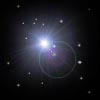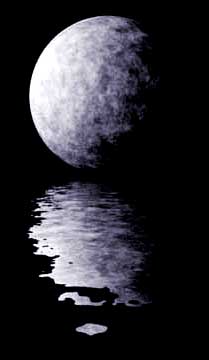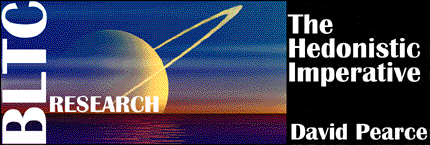
Section Ten
Unanswered Questions
"God made everything out of nothing.But the nothingness shows through."
Paul Valéry
"The void yields up nothing. You
have to be a great poet to make it ring."
Jules Renard

![]() We don't know. If post-Everett
universal QM is right, then as it stands it's a bizarre and utterly incongruous
coincidence that "everything and nothing" should be the case - outside of
the poetic excesses of Eastern metaphysics. On the other hand, as far as I
can tell, there isn't a single sentence of this essay which isn't itself
deeply problematic: ill-defined in its usage of terms or its presuppositions,
and frequently both at the same time. Partly this may be because such an exercise
in wild speculation tries to do what simply can't be done. This is to map
out an explanation-space, using the more-or-less everyday 21th Century
idiom of one species of genetic vehicle, Homo sapiens, of something
which is almost certainly beyond me, and may be beyond anyone, namely a total
explanation for absolutely everything and anything. Plausibly, some vital
ingredient and/or interpretational principle is missing from our efforts.
It isn't clear whether any of the finite number of possible mind/brain states
which anyone, anywhere, might ever instantiate could embody such knowledge.
We don't know. If post-Everett
universal QM is right, then as it stands it's a bizarre and utterly incongruous
coincidence that "everything and nothing" should be the case - outside of
the poetic excesses of Eastern metaphysics. On the other hand, as far as I
can tell, there isn't a single sentence of this essay which isn't itself
deeply problematic: ill-defined in its usage of terms or its presuppositions,
and frequently both at the same time. Partly this may be because such an exercise
in wild speculation tries to do what simply can't be done. This is to map
out an explanation-space, using the more-or-less everyday 21th Century
idiom of one species of genetic vehicle, Homo sapiens, of something
which is almost certainly beyond me, and may be beyond anyone, namely a total
explanation for absolutely everything and anything. Plausibly, some vital
ingredient and/or interpretational principle is missing from our efforts.
It isn't clear whether any of the finite number of possible mind/brain states
which anyone, anywhere, might ever instantiate could embody such knowledge.
![]() Yet perhaps our pessimism is misplaced. In a nutshell, it seems incoherent
to suppose that it's the case that nothing could have been the case. This
may be because the notion of unactualised possibility is of purely epistemological
significance. But it may be because there simply isn't any sense one can extract
from the notion of nothing whatsoever being so in the first instance. Thus
if what were the case had been - is? - minimally 0 - an acausal, non-spatio-temporal
condition or state of affairs - then its strict equivalence, modelled on the
surprisingly rich mathematical properties of zero, to a plenitude of other
states of no net substantive contribution would strictly and trivially entail
their subsistence too - since they amount to exactly the same thing under another
description. In setting out to formalise and make rigorous one's hazy notional
alternative to something existing, namely "nothing", we may be groping towards
some account of why the intuitive dichotomy is ill-conceived.
Yet perhaps our pessimism is misplaced. In a nutshell, it seems incoherent
to suppose that it's the case that nothing could have been the case. This
may be because the notion of unactualised possibility is of purely epistemological
significance. But it may be because there simply isn't any sense one can extract
from the notion of nothing whatsoever being so in the first instance. Thus
if what were the case had been - is? - minimally 0 - an acausal, non-spatio-temporal
condition or state of affairs - then its strict equivalence, modelled on the
surprisingly rich mathematical properties of zero, to a plenitude of other
states of no net substantive contribution would strictly and trivially entail
their subsistence too - since they amount to exactly the same thing under another
description. In setting out to formalise and make rigorous one's hazy notional
alternative to something existing, namely "nothing", we may be groping towards
some account of why the intuitive dichotomy is ill-conceived.
![]() In doing so, we may find that our sense
of astonishment at the existence of the world is misplaced. Perhaps the world is a disguised implication of our intuition that it's "natural" for there to be nothing at all. For once the conceptual
revolution needed to turn The Zero Option from philosophical wordspinning into
a mathematically rigorous and mature TOE has been achieved(?), the inescapable necessity of the zero ontology may even appear obvious to a future superintelligence.
In principle, after all, the zero explanation is supremely and elegantly simple to the point
of triviality. Perhaps we have marvelled at the existence of the world in
the past simply because we have misconstrued what was the case - which in
fact is the very opposite of a state of affairs where marvel would be called
for. A sense of surprise would be appropriate only if we discovered something
that didn't cancel out, a "substantive" property. But this is a supernatural impossibility - I'm hypothesising. It would be a miracle. Hence its notional discovery would merit very great surprise indeed.
In doing so, we may find that our sense
of astonishment at the existence of the world is misplaced. Perhaps the world is a disguised implication of our intuition that it's "natural" for there to be nothing at all. For once the conceptual
revolution needed to turn The Zero Option from philosophical wordspinning into
a mathematically rigorous and mature TOE has been achieved(?), the inescapable necessity of the zero ontology may even appear obvious to a future superintelligence.
In principle, after all, the zero explanation is supremely and elegantly simple to the point
of triviality. Perhaps we have marvelled at the existence of the world in
the past simply because we have misconstrued what was the case - which in
fact is the very opposite of a state of affairs where marvel would be called
for. A sense of surprise would be appropriate only if we discovered something
that didn't cancel out, a "substantive" property. But this is a supernatural impossibility - I'm hypothesising. It would be a miracle. Hence its notional discovery would merit very great surprise indeed.
![]() So summarising: the existence of the
world is inexplicable only if there is an alternative. But the intuitive alternative
- i.e. the hypothetical inexistence of any properties at all - is unintelligible.
Explicating this supposed alternative invariably entails ascribing different
properties, derived from one's pre-theoretic intuitions about dark timeless voids, dreamless sleep etc, rather than no properties. Thus the otherwise natural candidate
for "default condition" isn't viable as it stands. But critically, a scenario analogous
to the absence of any properties, namely a universe with no net properties
(no net energy, spin or charge, nor anything derivable therefrom), is
intelligible; and it inherits the role of natural default condition. So assuming
both 1] the notion of an absence of any properties at all is cognitively meaningless,
and 2] the existence of any substantive properties is (or rather would
be) inexplicable, then perhaps the zero ontology simply has to subsist
or be the case.
So summarising: the existence of the
world is inexplicable only if there is an alternative. But the intuitive alternative
- i.e. the hypothetical inexistence of any properties at all - is unintelligible.
Explicating this supposed alternative invariably entails ascribing different
properties, derived from one's pre-theoretic intuitions about dark timeless voids, dreamless sleep etc, rather than no properties. Thus the otherwise natural candidate
for "default condition" isn't viable as it stands. But critically, a scenario analogous
to the absence of any properties, namely a universe with no net properties
(no net energy, spin or charge, nor anything derivable therefrom), is
intelligible; and it inherits the role of natural default condition. So assuming
both 1] the notion of an absence of any properties at all is cognitively meaningless,
and 2] the existence of any substantive properties is (or rather would
be) inexplicable, then perhaps the zero ontology simply has to subsist
or be the case.
![]() Yet why, then, does any(every)thing
- 0 - "subsist"? Is any notion of "non-subsistence", no properties at all as distinct from no net properties, simply incoherent - a
contradiction-in-terms? Merely relabelling, or more charitably first reconceptualising
and then relabelling, the notion of existence might seem just to shift the
problem, not solve it. For dissolving the spectre of an infinite regress of
explanations was touted as one of the virtues of this whole approach at the
outset. So what is it that enables 0, zero net properties, to be the case or subsist, as distinct
from not being the case? How does the "cancelling out" of the universal quantum superposition occur? Why is
it necessary? Must it obtain on pain of any substantive property existing? Why?
Presumably, on this account, what each of us apprehends is in some small way
a part of the cancellation process, as are we ourselves. But here the details are vague precisely
where they are most interesting. What is the link between 0, the quantum vacuum, and
knot/superstring/M-brane theory? Even if mathematics is homomorphic, or in
some sense identical, to what subsists, including the fabulously diverse textures
of what-it's-like-ness, how in practice can the latter be decoded from the
former? How is the ultimate, and ultimately the only(?), variable of what-it's-like-ness
itself bound up with the subsistence of 0? Does something akin to The
Zero Ontology offer a viable research program - or is the "null hypothesis" of existence a delusive dead-end?
Yet why, then, does any(every)thing
- 0 - "subsist"? Is any notion of "non-subsistence", no properties at all as distinct from no net properties, simply incoherent - a
contradiction-in-terms? Merely relabelling, or more charitably first reconceptualising
and then relabelling, the notion of existence might seem just to shift the
problem, not solve it. For dissolving the spectre of an infinite regress of
explanations was touted as one of the virtues of this whole approach at the
outset. So what is it that enables 0, zero net properties, to be the case or subsist, as distinct
from not being the case? How does the "cancelling out" of the universal quantum superposition occur? Why is
it necessary? Must it obtain on pain of any substantive property existing? Why?
Presumably, on this account, what each of us apprehends is in some small way
a part of the cancellation process, as are we ourselves. But here the details are vague precisely
where they are most interesting. What is the link between 0, the quantum vacuum, and
knot/superstring/M-brane theory? Even if mathematics is homomorphic, or in
some sense identical, to what subsists, including the fabulously diverse textures
of what-it's-like-ness, how in practice can the latter be decoded from the
former? How is the ultimate, and ultimately the only(?), variable of what-it's-like-ness
itself bound up with the subsistence of 0? Does something akin to The
Zero Ontology offer a viable research program - or is the "null hypothesis" of existence a delusive dead-end?
![]() As an out-and-out qualia-freak, I've
advocated a radical idealist monism. Values of what-it's-like-ness and its patterns
is all that there is. Numerically encoded, they cancel to zero too. The universal QM formalism describes symmetry transformations
of subjectivity which is interconverted but ubiquitously conserved. Yet if
so, why should what-it's-like-ness be the fire in the equations? One or two
tricky puzzles remain.
As an out-and-out qualia-freak, I've
advocated a radical idealist monism. Values of what-it's-like-ness and its patterns
is all that there is. Numerically encoded, they cancel to zero too. The universal QM formalism describes symmetry transformations
of subjectivity which is interconverted but ubiquitously conserved. Yet if
so, why should what-it's-like-ness be the fire in the equations? One or two
tricky puzzles remain.

